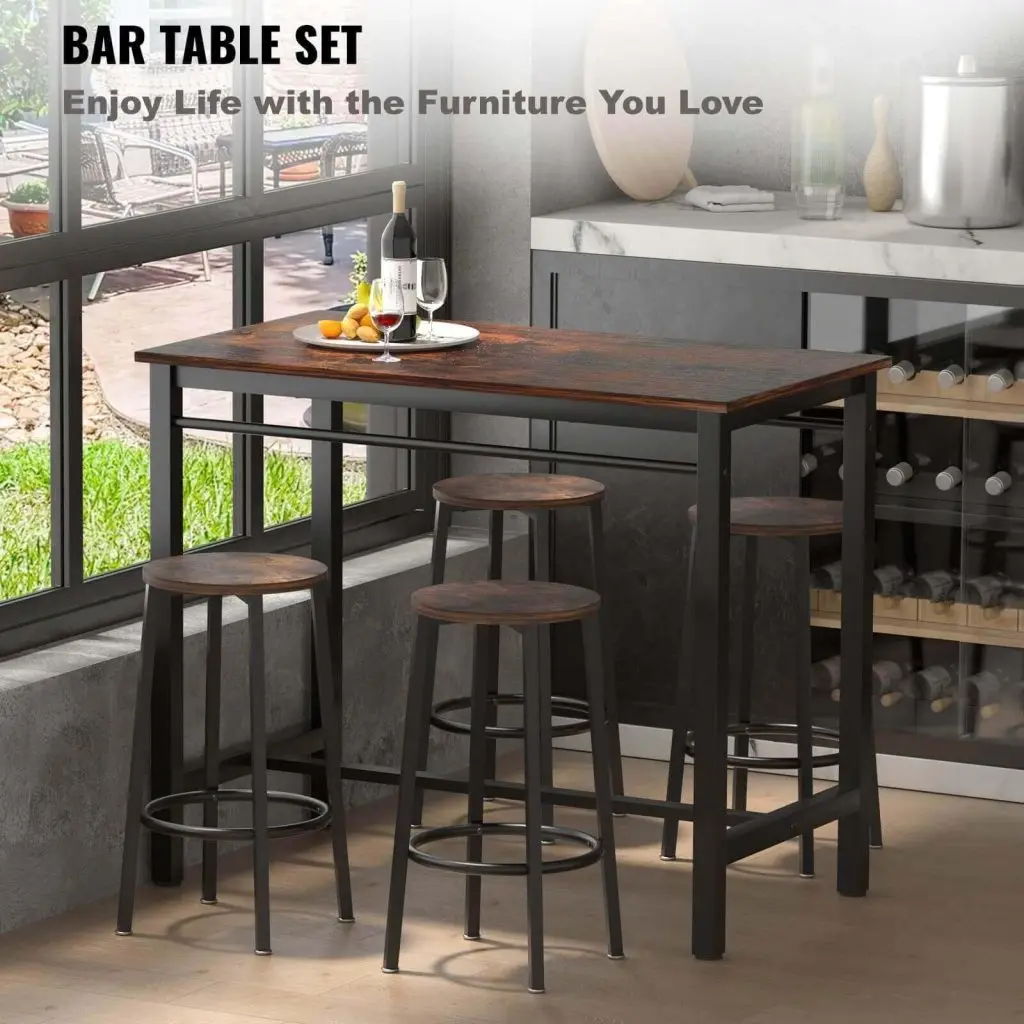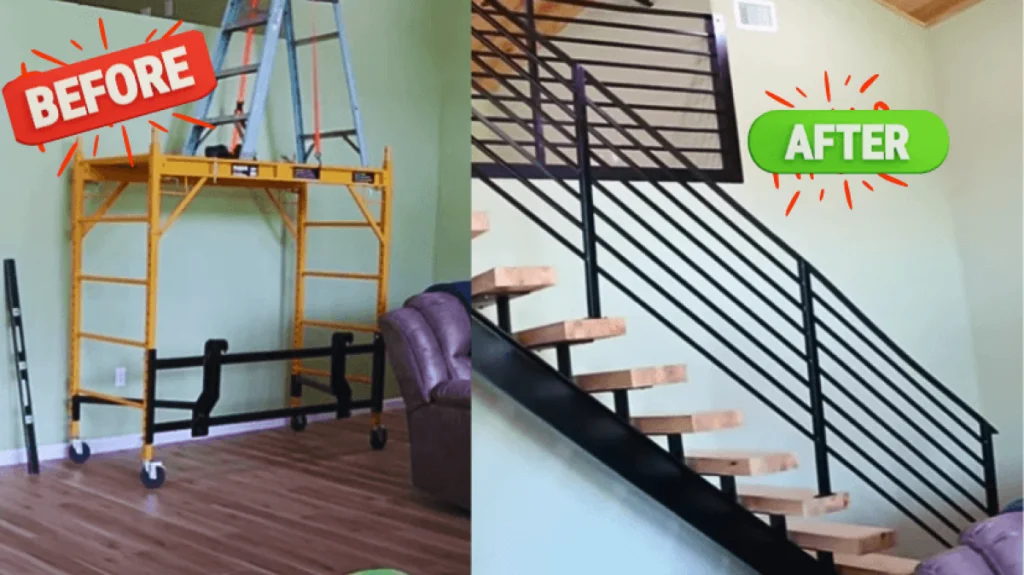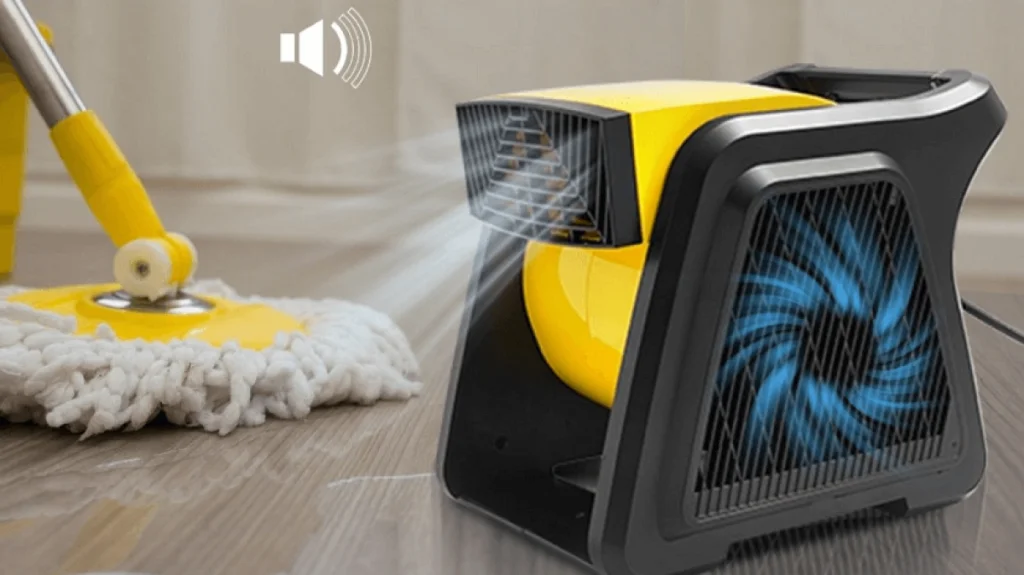If you’re looking for a new type of flooring for your home, you might not know what to choose. After all, there are many different types of flooring, and they all have different features, pros, and cons. Making the right choice can be difficult, but doing so is important. You need your home to not only look good but be practical as well.
This is why flooring matters, because the type you choose determines maintenance needs, how long it lasts for, how resilient it is towards various elements, and more.
Today, we want to compare two very popular types of flooring, vinyl and carpet. This carpet vs vinyl flooring comparison will provide you with all of the information that you need to make an informed decision between the two.
Table of contents
What is Vinyl Flooring?
First, we have vinyl flooring, which is a type of material that is made from PVC or polyvinyl chloride. It’s a very durable type of flooring that is often used in high-traffic areas. Also, it’s used in places that are often exposed to lots of moisture, like kitchens, bathrooms, basements, and garages.
It’s super durable and easy to maintain, and moisture resistant too. It can come in tiles, planks, sheets, and more, plus it can be made to resemble other materials like stone and wood. It’s both affordable and versatile, which makes it a popular flooring option among many.
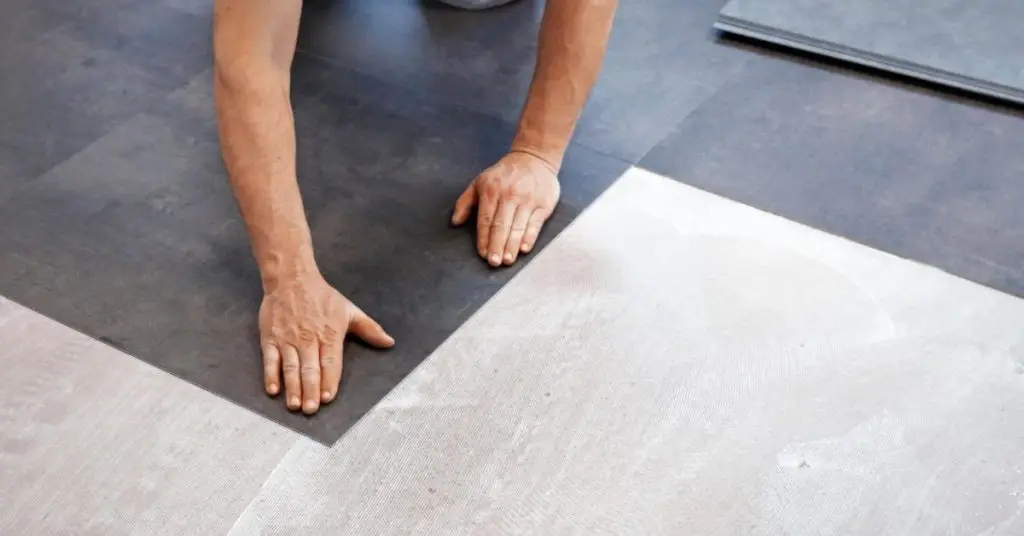
What is Carpet?
We then have carpet, which is the type of textile floor. It’s usually made with a backing and an upper layer of pile. The pile can be made out of a variety of materials. This could be polypropylene, wool, polyester, nylon, or other materials as well. Carpets can be tufted or woven, which results in different patterns and textures.
Carpets are great because they’re warm and soft, and they provide you with a comfortable walking surface. They’re also great for absorbing sound. This is why many people put carpets in living rooms, bedrooms, and offices. Carpets also come in many different thicknesses, styles, and colors.
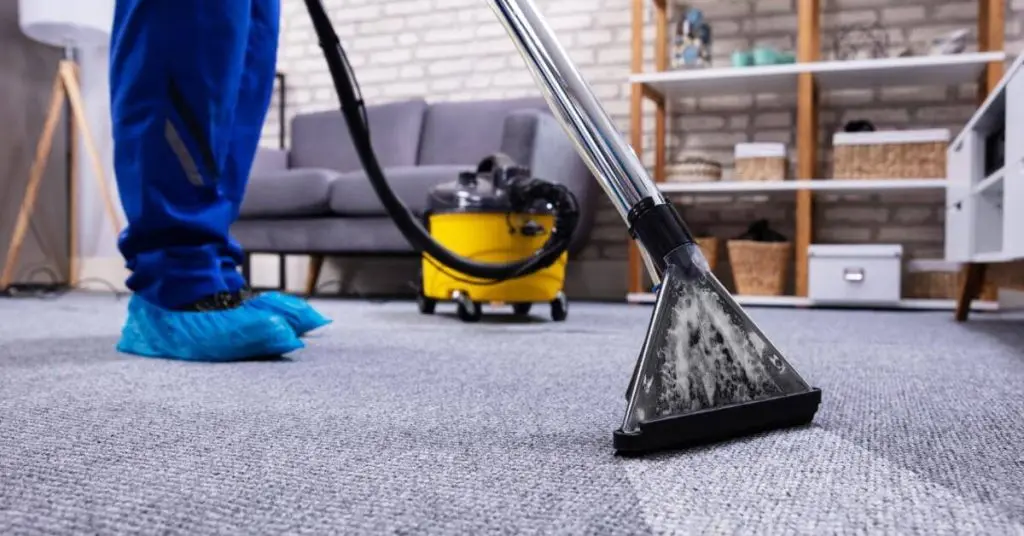
Carpet vs Vinyl: The Pros & Cons
Both carpet and vinyl flooring are good options to consider, but they do also have specific pros and cons that you need to keep in mind before making a choice.
Benefits of Vinyl Flooring
Let’s take a look at the pros of choosing vinyl flooring.
- Vinyl flooring is very durable. It’s tough, strong, and easily able to withstand a lot of foot traffic. This is why many people choose it for places where a lot of people walk.
- Vinyl flooring is super water resistant, almost waterproof. It’s therefore a good option for areas that see a lot of moisture.
- Vinyl floors can just be swept and mopped. They don’t stain easily and are super easy to maintain.
- Because vinyl comes in so many different styles, it can be used to mimic ceramic, stone, and wood.
One of the biggest benefits of vinyl flooring is quite simply that it’s super affordable.
The Drawback of Vinyl Flooring
Let’s take a look at the cons of choosing vinyl flooring.
- Although vinyl flooring can be made to resemble different materials, it won’t ever look super authentic or luxurious.
- Vinyl flooring can be very hard underneath the foot. It’s not overly comfortable to stand on for long periods of time.
- Vinyl also isn’t overly good for the environment. Making it involves the use of many chemicals that are most certainly detrimental to the environment.
The Benefits of Carpet
Let’s take a look at the pros of choosing carpet.
- Carpets are very soft, and they are comfortable to walk on. They provide a bit of cushioning underneath the foot.
- A big benefit of carpeted floors is that they absorb sounds. It helps create a quieter environment in your home by absorbing vibrations.
- Although many people might not consider this, carpets are also great for insulation. They keep rooms cooler during the summer and warmer during the winter.
- Because carpets come in so many different textures, colors, and styles, you can easily match them to your aesthetic appeal.
The Drawbacks of Carpet
Let’s take a look at the cons of choosing carpet.
- Carpets aren’t the most durable and they will eventually wear down and lose some of their pile.
- Carpets stain easily. They’re also quite difficult to clean because you can’t just sweep and mop them.
- On that note, carpets need a lot of maintenance. You usually have to vacuum and deep clean them to remove allergens, stains, and dirt.
- The other issue with carpets is that they hold on to pet dander, dirt, dust, allergens, and more.
Vinyl vs Carpet Flooring: The Main Differences
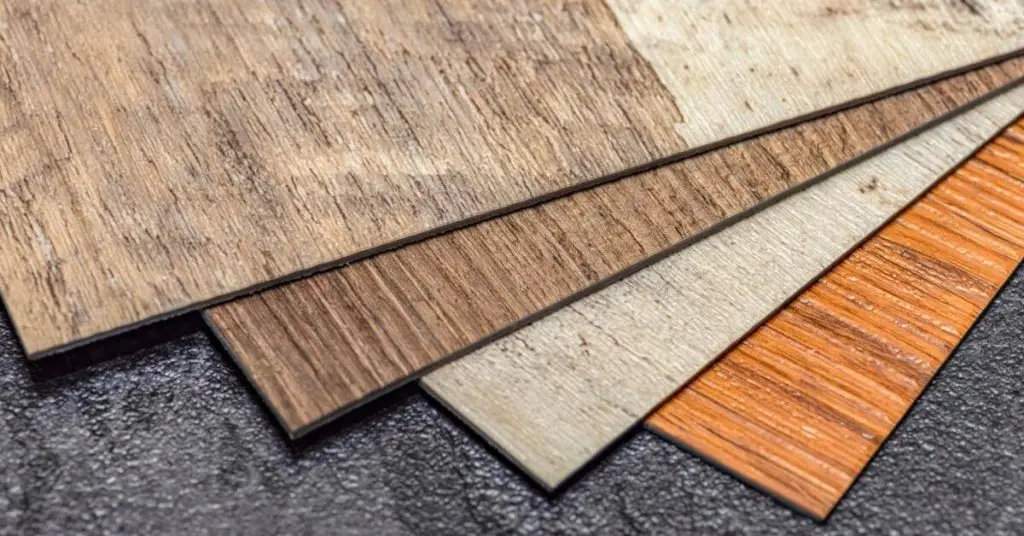
Now that we know all of the basics, let’s take a look at the main differences between vinyl flooring and carpet flooring.
Materials
These two types of floors are made out of different materials. Vinyl flooring is essentially plastic. It’s made out of PVC or polyvinyl chloride.
This is a good material for areas that need a lot of water resistance and need to be able to resist a lot of foot traffic. Some types of vinyl flooring might also include extra layers for a bit of added cushioning and stability.
On the other hand, we have carpet, which is made out of fiber. These fibers could be polypropylene, nylon, polyester, wall, and more.
Carpets also have a special backing designed to provide both support and structure. The difference in material generally leads to all of the other differences that we’re about to talk about.
Durability
Perhaps one of the most important considerations here is durability. The simple fact is that vinyl flooring is much more durable than carpet. Although there are some carpet materials that can be durable, in the grand scheme of things, carpets just can’t take as much wear and tear as vinyl floors can.
Vinyl floors are much more resistant to water, staining, and physical damage. This is why many people choose vinyl flooring for high-traffic areas. Although carpet might be soft and plush, it stains easily, parts can break or rip off, and maintenance isn’t any fun either.
Comfort
On the flip side of the equation, consider that carpet is much more comfortable. There are some pretty thick carpets out there, and they can be super soft and comfortable to walk on. That’s why a lot of people put carpets in the living rooms, bedrooms, and other areas where comfort is a top priority.
Now, vinyl can also be comfortable in the right circumstances. In some cases, you can put an underlayment underneath the vinyl, to provide a bit of extra cushioning. However, the fact of the matter remains the same, it’s not nearly as soft or comfortable as carpet.
What you also need to consider is that vinyl isn’t nearly as good for insulation purposes and for sound dampening, both comfort factors that carpet has in its corner.
Aesthetic Appeal
What’s really cool about vinyl flooring is that there are plenty of different designs, specifically ones made to look like other materials, particularly ceramic, stone, and wood. Vinyl can be relatively sleek looking, although it doesn’t come close to recreating the materials it’s meant to recreate.
Carpet is different in this sense, as it also comes in many different patterns, colors, and textures. If you want to add some coziness or warmth to a room, then it’s carpet that you need. We really can’t say which one is better on this front, because it really depends on your own personal preferences.
Maintenance
Something that does need saying is that vinyl floors are much easier to maintain than carpets. With vinyl, you can just sweep and mop them. They aren’t susceptible to staining and they’re water resistant too. Vinyl also doesn’t hold onto allergens, another pro in its corner.
Carpets on the other hand are much harder and more laborious to maintain. First, carpets hold onto more allergens and dirt, plus they stain easily.
This means that they require maintenance more often than vinyl floors. However, the maintenance itself is also harder, because you can’t just sweep and mop a carpet. Carpets need to be deep cleaned with special machines on a regular basis to maintain cleanliness.
Installation
Vinyl is pretty easy to install, and it can often be done yourself. You can find it in planks, tiles, or sheets. Vinyl flooring can be installed as a floating floor, or you can glue the pieces down.
If we’re talking about carpet, however, the installation process is much harder. Generally speaking, if you’re looking for a good result, it’s something that requires a professional. Installing a carpet on your own if you haven’t ever done it before is nearly impossible.
Cost
The final consideration you should make here is the cost. The big benefit of vinyl flooring is that it is very affordable. It’s a big part of why so many people choose it. Yes, there are higher end types of vinyl flooring that mimic other materials which may be more expensive. However, even these are usually quite affordable.
That said, carpet is generally more expensive. Synthetic options like polyester are usually cheaper, although there are natural fibers like wool that can cost many times more. Overall, due to the materials, installation, and maintenance needs, you can expect carpet to cost more than vinyl, both in the long and short run.
FAQs About Carpet vs Vinyl Flooring
Let’s quickly go over some of your most frequently asked questions about carpet and vinyl flooring.
Which type of floor is better for pets?
If you have pets, you probably want to go with vinyl flooring. It’s more resistant to stains and scratches. It’s also much more durable, and it’s also much easier to clean. Carpet on the other hand traps stains, odors, and hairs.
Which type of floor is better for those with allergies?
Vinyl flooring is also better for people with allergies than carpet is. Carpets hold on to pet dander and other allergens and can be difficult to clean. Vinyl doesn’t hold on to these allergens, and any allergens present can be easily mopped up.
Can I install vinyl over old floors?
As long as the floor underneath is dry, clean, and level, you should be able to install vinyl floors over top.
Which type of floor is better for moisture resistance?
If you need a type of flour that is resistant to moisture, then vinyl is really the only option to go with. Carpet actually absorbs moisture and it takes a long time to dry. The longer it takes to dry, the bigger the chances of mold and mildew developing.
How do the lifespans of these two types of flooring compare?
Depending on how well the carpet is maintained and what type of material it is made out of, it could last for up to 15 years. However, this could also be much less. Vinyl flooring usually has a much longer lifespan, often up to 20 years or longer.
The Bottom Line on Vinyl vs Carpet
The bottom line is that vinyl floors are cheaper, more durable, and easier to maintain, making them prime options for many areas. That said, if you want a bit of warmth and coziness, then yes, carpet is better. With all of that in mind, remember that brands like VEVOR sell special marine carpets that are highly resistant to moisture and can be easily cleaned, too. If you need a carpet for a high-traffic and high-moisture area, the VEVOR Marine Carpet might just be your best bet.


